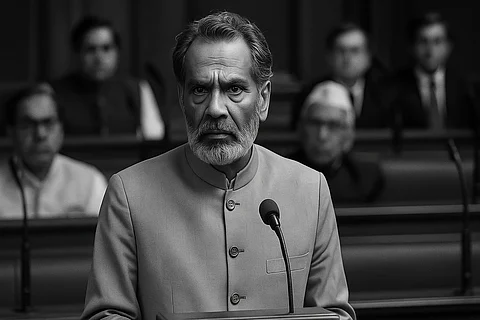
- Home
- न्यूजग्राम
- NewsGram USA
- India
- World
- Politics
- Entertainment
- Culture
- Lifestyle
- Economy
- Sports
- Sp. Coverage
- Misc.
- NewsGram Exclusive
- Jobs / Internships

Chandra Shekhar was a fiery idealist, a committed socialist, and one of India’s most principled political leaders whose life reflected a deep commitment to democratic values and social transformation. Born in a humble farming family in Ballia, Uttar Pradesh, he rose from student activism to become India’s 8th Prime Minister. Known as a “Young Turk” for his courage in standing up to entrenched power, Chandra Shekhar believed that politics should be driven by ideology—not personality or convenience. His political career was shaped by a lifelong fight against inequality, injustice, and authoritarianism, which earned him respect across party lines, even as he often stood in political isolation.
Though Chandra Shekhar’s tenure as Prime Minister in 1990–91 was brief, it came at a pivotal moment in India’s history—marked by political instability, economic turmoil, and rising communal tensions. However, his legacy extends far beyond those few months in office. From boldly opposing the Emergency despite being part of the ruling Congress Party, to founding his own socialist party and working alongside Jayaprakash Narayan—widely known as JP or Lok Nayak, a key figure who led the 1970s movement against Prime Minister Indira Gandhi calling for a “total revolution”—Chandra Shekhar’s political journey was defined by his steadfast commitment to democratic values and social justice.
His Brief Term as Prime Minister
Chandra Shekhar became India’s 8th Prime Minister on November 10, 1990, leading a minority government with just 54 MPs in the Lok Sabha. He had broken away from Janata Dal and formed the Samajwadi Janata Party, and came to power with the outside support of the Congress Party, led by Rajiv Gandhi.
However, the alliance was fragile from the start. After just about four months in office, on March 6, 1991, Chandra Shekhar resigned in protest, accusing Congress of betrayal. Congress had withdrawn its support, claiming his government was spying on Rajiv Gandhi. In an angry speech, the former PM from the Janata Dal (Socialist) party said that his minority government was not a puppet of the Congress which kept him in power. Chandra Shekhar, unwilling to be controlled by Congress, stated in his resignation speech that he could not run the government under such conditions.
“I cannot run the government in keeping with their behaviour.”
With no other party willing to form a new government, President R. Venkataraman accepted the resignation but asked Chandra Shekhar to continue as caretaker Prime Minister until new elections were held. He remained in this role until June 21, 1991, when P.V. Narasimha Rao took office after Congress won the general elections.
Chandra Shekhar’s tenure remains one of the shortest in Indian history, but it was marked by political turbulence, realignments, and a principled stand against being used as a puppet government.
See Also:
Political Career and Background
Chandra Shekhar began his political journey as a student with a deep interest in socialist ideals. After earning a Master’s in Political Science from Allahabad University (1950–51), he joined the Praja Socialist Party, rising quickly to become its General Secretary in Uttar Pradesh. He was influenced by senior socialist leaders like Acharya Narendra Dev.
In 1962, he entered Parliament through the Rajya Sabha, and by 1965, he joined the Indian National Congress. Known for his honesty and commitment to social justice, he emerged as one of the Congress’s bold voices—part of the “Young Turks”, who criticized inequality and elitism within the party.
He supported Dalit rights, challenged class privilege, and emphasized ideology-based politics. His strong views brought him close to Jayaprakash Narayan in the early 1970s. During the Emergency (1975–77), despite being in the Congress, he was jailed under Maintenance of Internal Security Act (MISA), standing firm against authoritarianism.
He also founded the magazine Young Indian, which was a platform for independent political thought. His prison writings, later published as Meri Jail Diary, and essays like Samajik Parivartan ki Gatisheelta, reflect his lifelong commitment to democracy and social transformation.
Other Contributions and Personal Life
Shri Chandra Shekhar was born on April 17, 1927, in Ibrahimpatti, a village in the Ballia district of Uttar Pradesh, into a humble farmer’s family. He began his parliamentary career in 1962 and, except for a brief period between 1984 and 1989, remained a Member of Parliament throughout his life. In 1977, he became the President of the Janata Party and held the position until 1988.
One of the defining moments of his public life came in 1983, when he undertook a 4,260-kilometer padyatra (foot march) from Kanyakumari to Rajghat in New Delhi. This journey, spanning from January 6 to June 25, was aimed at connecting with the people and understanding their struggles firsthand. To extend this engagement, he later established around fifteen Bharat Yatra Kendras (India Journey Centres) across states like Kerala, Tamil Nadu, Karnataka, Maharashtra, Madhya Pradesh, Gujarat, Uttar Pradesh, and Haryana. These centres worked to train social and political workers and promote grassroots development in backward areas.
In the 1989 general elections, he contested and won from two constituencies—Ballia in Uttar Pradesh and Maharajganj in Bihar—eventually vacating the latter. Shri Chandra Shekhar was married to Smt. Dujja Devi and had two sons, Pankaj and Neeraj. His elder son, Pankaj Singh, joined the Bharatiya Janata Party (BJP) in the presence of party president Rajnath Singh at the BJP headquarters. His younger son, Neeraj Shekhar Singh (born 10 November 1968), served two terms as a Lok Sabha MP and later became a Rajya Sabha MP, initially as a member of the Samajwadi Party. In 2019, he joined the BJP and was re-elected to the Rajya Sabha. Chandra Shekhar’s own party, the Samajwadi Janata Party, is now virtually defunct, as both his sons have aligned themselves with other political formations. [Rh/VP]
